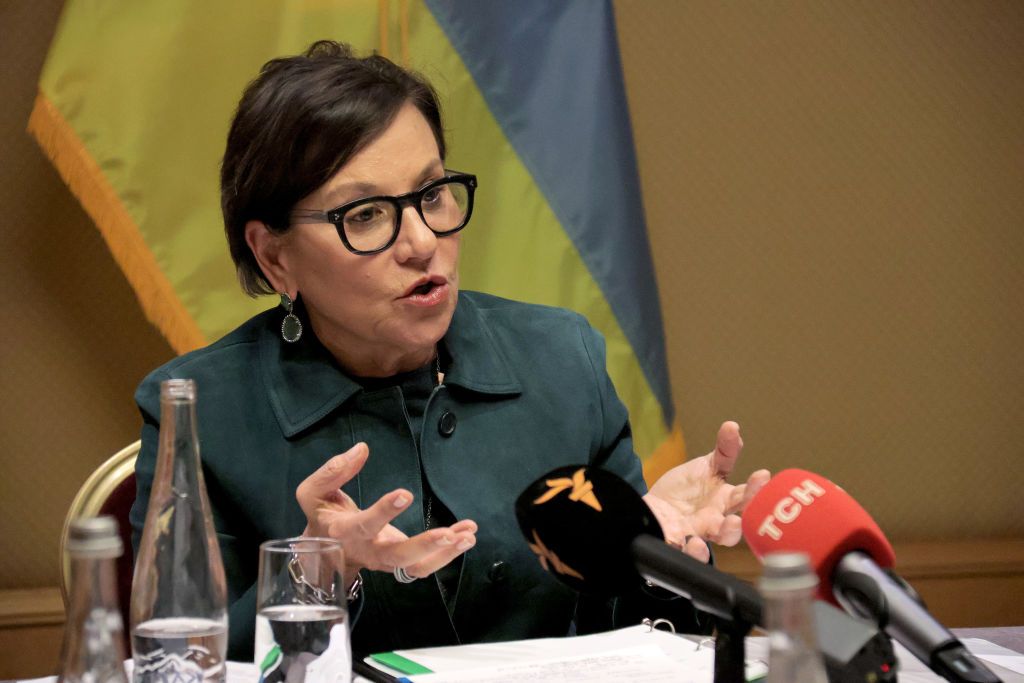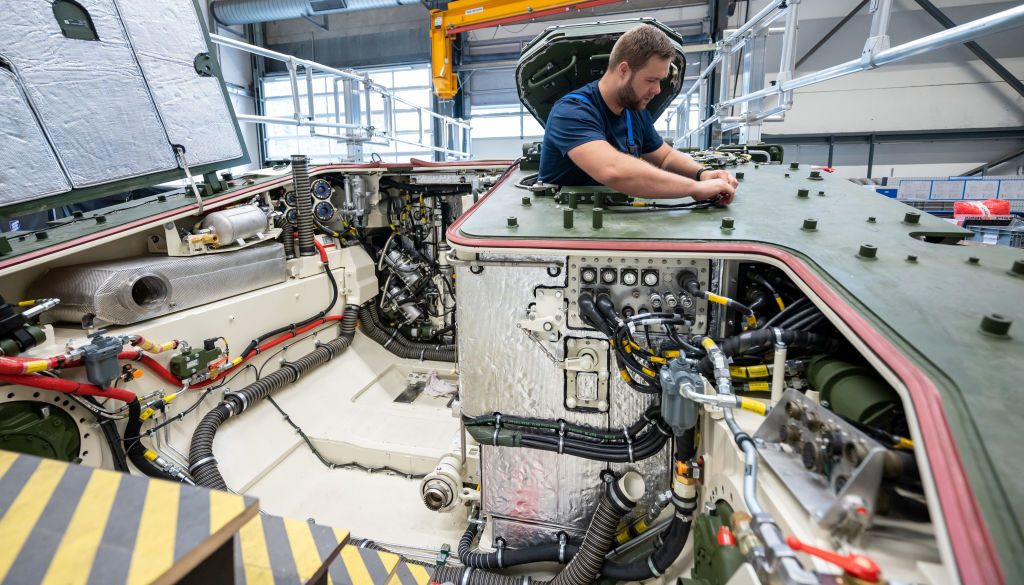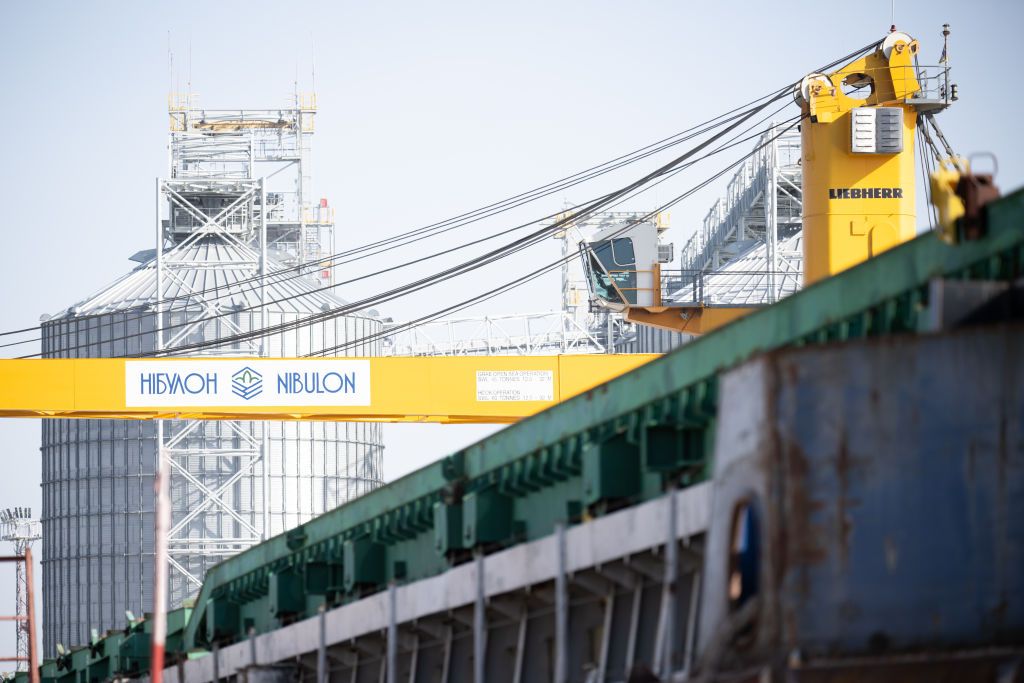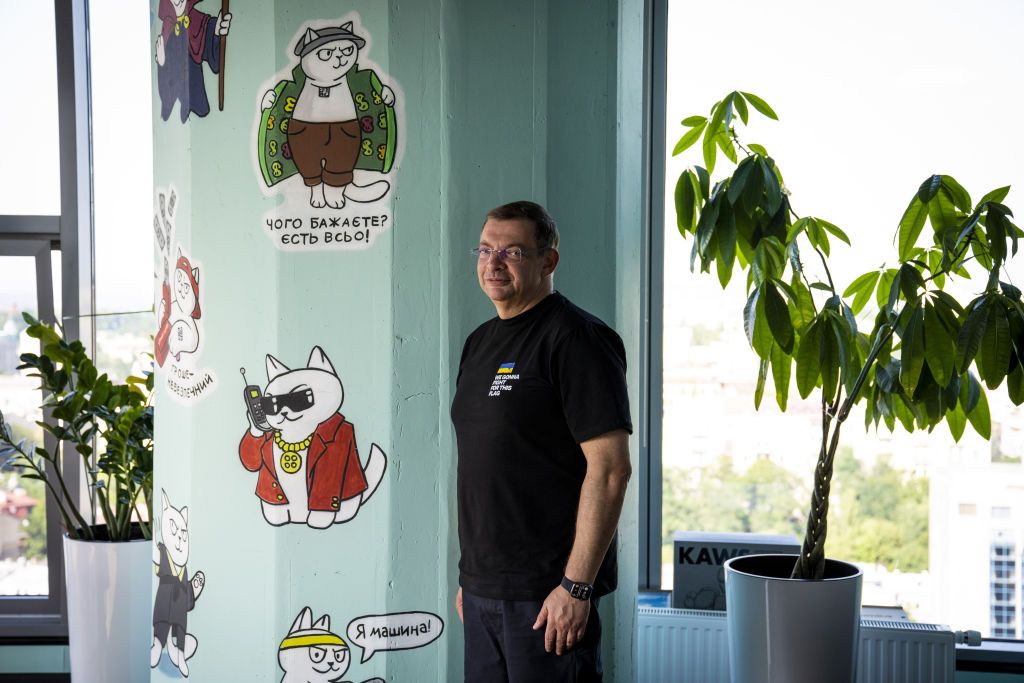Ukraine Business Roundup — January 16
The following is the Jan.
16, 2024 edition of our Ukraine Business Roundup weekly newsletter. To get the biggest news in business and tech from Ukraine directly in your inbox, subscribe here.
Davos
The world's governments and major international organizations are meeting in the Swiss town of Davos for the 54th Annual Meeting of the World Economic Forum (WEF) this week from Jan.
14-19. The forum's theme this year is "Rebuilding Trust" and is focused on four pillars: security, job growth, artificial intelligence, and climate.
For Ukraine, Davos is a chance to keep the world's attention on its cause and to get in front of the global business elite in the hopes of convincing them Ukraine is a worthwhile place to put its money. Eighty countries and one international organization attended the fourth national security advisers' meeting on Ukraine's Peace Formula at Davos on Jan.
14. Andriy Yermak, head of the office of the president, was present at the meeting.
President Volodymyr Zelensky arrived in Davos on Jan.
16, where he met with NATO Secretary General Jens Stoltenberg, European Commission President Ursula von der Leyen, as well as the world's finance leaders, including JPMorgan Chase CEO Jamie Dimon, BlackRock Vice Chairman Philipp Hildebrand, and CEO of Blackstone Group Stephen Schwarzman. Lakshmi Mittal, the chairman of ArcelorMittal, a steel manufacturer that is one of Ukraine's biggest international investors, as well as Carlyle Group Inc. co-founder David Rubenstein, U.S. Special Representative for Ukraine's Economic Recovery Penny Pritzker, and others were also present at the meeting with the finance giants.
During the meeting, Zelensky underscored the importance of attracting private capital to reconstruction projects in Ukraine, the Presidential Office's website said. The New York-based bank has been working with the presidential administration to attract that private capital. Last September, JPMorgan executives hosted a roundtable with Zelensky that included billionaire Mike Bloomberg, BlackRock CEO Larry Fink, former Google CEO Eric Schmidt, and others to discuss reconstruction and investment opportunities in Ukraine.
Ukraine's Digital Transformation Minister Mykhailo Fedorov was also at Davos, where he met with Palantir, IBM, Cisco, Amazon Web Services, Visa, SAP. In a post on Telegram, Fedorov personally thanked each company for their work in Ukraine. According to the minister, IBM is planning on translating its software into Ukrainian, and Amazon Web Services has allocated £100 million in aid to Ukraine since 2022.
"The day was very busy and productive. We will continue to work for Ukraine," Fedorov wrote on Telegram on Jan.
15.
 U.S. Special Representative for Economic Recovery Penny Pritzker speaks during a press briefing in Kyiv on Jan.
U.S. Special Representative for Economic Recovery Penny Pritzker speaks during a press briefing in Kyiv on Jan.
12, 2024. (Yevhen Kotenko / Ukrinform/Future Publishing via Getty Images)
Recovery
Before heading to Davos, U.S. Special Representative for Economic Recovery in Ukraine Penny Pritzker, along with representatives of American businesses, arrived in Kyiv on Jan.
12, where she met with top Ukrainian officials, including Prime Minister Denys Shmyhal and Infrastructure Minister Oleksandr Kubrakov. "The key theme (of the meeting) is the strengthening of the Ukrainian economy, the short-term recovery, and long-term development," said Shmyhal. "We are counting on the participation of private companies from the U.S. in the reconstruction of Ukraine," adding that one of the main focuses was ensuring the stability of Ukrainian exports.
Pritzker commented on the meeting with Shmyhal, saying they discussed "the positive impacts of Ukraine's reform agenda, export routes, and how we can operationalize ways to increase private sector investment." She also thanked Kubrakov for "a substantive discussion with Ukrainian officials and private sector reps on practical steps to increase Ukraine's exports and restore its economic vitality, a crucial counterpoint to Russia's aggression." Pritzker and the delegation also met with Parliament Speaker Ruslan Stefanchuk and representatives of the political parties in the Verkhovna Rada, Ukraine's parliament.
The parties addressed assistance to Ukraine's private sector and confiscating Russian sovereign assets frozen in the West. Speaking of those frozen assets at Davos on Jan.
15, Pritzker said the decision to seize them is unlikely to happen quickly, but isn't unrealistic. "I think there's enormous hope that the Russian sovereign assets could become an easy source of financing," Pritzker said.
 An employee works on the Lynx infantry fighting vehicle in Rheinmetall's production facility on June 6, 2023. (Philipp Schulze/picture alliance via Getty Images)
An employee works on the Lynx infantry fighting vehicle in Rheinmetall's production facility on June 6, 2023. (Philipp Schulze/picture alliance via Getty Images)
Joint ventures
This year, Ukraine has its sights on deeper ties with Western defense companies. To do so, the country is planning on creating joint defense enterprises with Western companies and bringing more weapons production to Ukraine.
As aid for Ukraine is at risk around the world, Kyiv knows developing its domestic weapons production is key in continuing to fight off its invading neighbor. Speaking with the Kyiv Independent on Jan.
10, Economy Minister Yuliia Svyrydenko said that Ukraine plans to launch five joint ventures with Western arms manufacturers this year, adding that Ukrainian Defense Industry, a state-owned enterprise that also operates under the name Ukroboronprom, is a "top priority" for the coming year. President Volodymyr Zelensky announced on Jan.
10 during his visit to Vilnius that Ukraine had "reached a number of significant agreements" that pave the way to joint defense production with Lithuanian companies. Defense Minister Rustem Umerov also announced on Jan.
5 that Ukraine and Latvia are planning joint projects in drone production. Umerov had said in December that the government aims to localize arms production in Ukraine in 2024.
The country is also planning to develop industrial parks and funds have been allocated for their renovation and construction. Currently there are 70 industrial parks registered in Ukraine, but in reality there are only 10 actually in operation, Svyrydenko said on Jan.
11 at an event dedicated to the review of the Ukrainian economy in 2023, organized by the Kyiv-based Center for Economic Strategy.
 A crane with the inscription of Nibulon, a Ukrainian agricultural, shipbuilding and transport company, stands between a silo and an empty grain ship moored in the harbor on Oct.
A crane with the inscription of Nibulon, a Ukrainian agricultural, shipbuilding and transport company, stands between a silo and an empty grain ship moored in the harbor on Oct.
21, 2023. (Sebastian Gollnow/picture alliance via Getty Images)
Why Ukraine needs investments, and now
With future funding from allies now uncertain and the state budget deficit estimated at Hr 1.57 trillion (£41.3 billion) this year, Ukraine's private sector must step in to keep the country afloat through tax contributions and employment while the government's fiscal efforts focus primarily on the war, Kyiv Independent business reporter Dominic Culverwell writes in a recent op-ed. Culverwell says he's spoken with numerous business leaders and financial chiefs who have all told him the same thing: Ukrainian companies need investments, not just financial aid.
While the latter is important, foreign investors are more likely to inject larger sums of money into Ukraine, helping its economic revival. There are obvious risks while the war is ongoing, but foreign investments will ensure that Ukrainian businesses can stand on their own two feet in the long run as well as forge relationships with international companies. If successful, the rewards for both parties will be high, particularly for those who get in early.
Ukrainian companies want to be self-sustainable, not constantly begging for donations. With reconstruction costs estimated to be around 411 billion euros (£449.9 billion), Ukraine will need to partially pay for this itself, which will have to be a joint effort from both the public and private sectors. Foreign entities willing to work with Ukrainian companies will bolster not only Ukraine's economy but also provide jobs and income to the countries investing, easing the fiscal pressure on Ukraine's allies and building fruitful commercial connections post-war, Culverwell writes.
Read the full opinion piece here.
 Oleg Gorokhovsky, chief executive officer of Monobank, at the mobile-only bank service provider's office in Kyiv, Ukraine on July 4, 2023. (Pete Kiehart/Bloomberg via Getty Images)
Oleg Gorokhovsky, chief executive officer of Monobank, at the mobile-only bank service provider's office in Kyiv, Ukraine on July 4, 2023. (Pete Kiehart/Bloomberg via Getty Images)
Talking business with Monobank
In our latest interview for our Talking Business in Ukraine series, we spoke to the mobile-only hugely popular Monobank's two co-owners Oleg Gorokhovskyi and Mykhailo Rogalskyi. The bank's application has facilitated nearly £1 billion in donations to fund the war effort since the start of Russia's full-scale invasion in February 2022. The Kyiv Independent: How has Monobank lived through these almost two years of war?
Oleg Gorokhovskyi: These almost two years have been mentally challenging for us, as for everyone. We had to make many unconventional business decisions regarding the team's safety, server security, and continuous office operation. We also had to shift our focus from business solutions to charity tools, organize fundraisers, and provide banking services for Ukrainians in Europe.
The Kyiv Independent: If we compare Monobank in December 2023 and January 2022, how does it differ from the pre-war period? Oleg Gorokhovskyi: We haven't laid off anyone or reduced any salaries. We have acquired a fintech startup and went from 2,611 to 2,741 employees (since the start of the full-scale invasion), which includes Universal Bank (Monobank's partner bank) and (Monobank developer) Fintech Band.
Regarding the number of clients, on Jan.
1, 2022, we had 6.77 million active clients, and now it's almost 8 million. The Kyiv Independent: How do you assess the current business climate in Ukraine? Mykhailo Rogalskyi: It's a good time for the development of small and medium-sized businesses in many niches.
As one of our acquaintances says, "In Kyiv now, it's like this: put a stick in the ground--and a cherry tree will grow." Read the full interview here.
What else is happening
Five EU members sign letter to Brussels demanding customs duties on Ukrainian food products. The EU members bordering Ukraine appealed to Brussels to impose customs duties on Ukrainian agricultural products, claiming local farmers are suffering significant losses, Hungary's Agriculture Minister Istvan Nagy said on Jan.
15. The agriculture ministries of Poland, Bulgaria, Hungary, Romania, and Slovakia sent a letter to Brussels requesting solutions for farmers in the eastern EU states.
They claim that cheaper Ukrainian products are undercutting local farmers, burdening agricultural production. Meanwhile, Romania's Agriculture Ministry agreed to meet several demands of Romanian farmers who have been blocking the country's major roads and two crossings on the border with Ukraine, Euractiv reported on Jan.
16. Border Guard: Polish truckers unblock 2 crossings at Ukraine border. Polish truckers ended their blockade of Korczowa-Krakovets and Hrebenne-Rava Ruska checkpoints -- two of the three border crossings with Ukraine that have been blocked by the truckers' protests since November last year, Ukraine's Border Guard Service reported on Jan.
16. Earlier the same day, Polish Infrastructure Minister Dariusz Klimczak announced that Warsaw had reached an agreement with the Polish truckers who would end their blockade of the border until March 1. Discussions are reportedly ongoing, the success of which will determine whether the truckers resume their protest after March 1.
Reuters: US Treasury deputy secretary to coordinate new Russia sanctions authority in Europe and Japan. U.S. Treasury Deputy Secretary Wally Adeyemo will hold meetings in Europe and Japan this month to coordinate a new Russia sanctions authority that focuses on financial institutions, Reuters reported on Jan.
15, citing a Treasury spokesperson. Speaking on condition of anonymity, the spokesperson told Reuters that the deputy secretary will focus on coordination with partners in using a "new tool" to prevent Russia's government from bypassing sanctions and getting supplied by G7 economies with critical goods for its military.
European Commission approves Romanian 126-million-euro fund to support Danube ports impacted by war. The European Commission approved on Jan.
11 a 126-million-euro (£138 million) fund to help strengthen Romanian port infrastructure and reduce congestion caused by increased Ukrainian exports. Romania plays a crucial role in Ukrainian exports amid Russia's threats to Black Sea maritime transport, shipping out almost 60% of Ukraine's produce. Romanian and Ukrainian officials have been working to expand the capacity of Romania's shipping infrastructure on the Danube River and Black Sea.
Ukraine designates Subway as 'international sponsor of war.' American fast food chain Subway has been added to Ukraine's list of "international sponsors of war" for its continued presence in the Russian market, the National Agency on Corruption Prevention (NACP) announced on Jan.
10.
Over 500 Subway franchises continue to operate in the Russian market, which pay "hundreds of thousands of dollars in taxes to the budget of the Russian Federation," the NACP said.
The "international sponsor of war" list is designed to be "a powerful reputational tool" to encourage the exit of international business from Russia and reduce Moscow's financial ability to continue its war against Ukraine.
Subscribe to the Newsletter
Ukraine Business Roundup
Subscribe